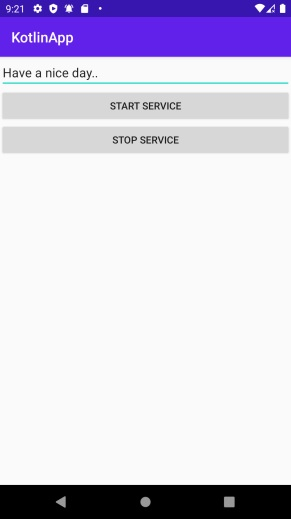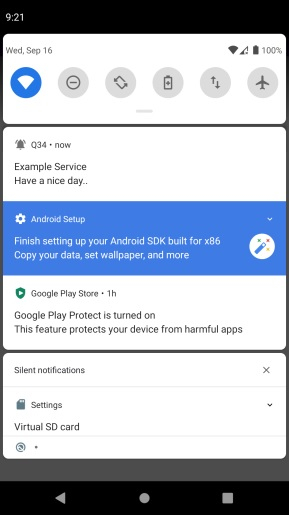如何在 Android 中使用 Kotlin 从服务发送通知?
此示例演示了如何在 Android 中使用 Kotlin 从服务发送通知。
步骤 1 - 在 Android Studio 中创建一个新项目,转到文件 ⇒ 新建项目,并填写所有必要信息以创建新项目。
步骤 2 - 将以下代码添加到 res/layout/activity_main.xml。
<?xml version="1.0" encoding="utf-8"?> <LinearLayout xmlns:android="http://schemas.android.com/apk/res/android" xmlns:tools="http://schemas.android.com/tools" android:layout_width="match_parent" android:layout_height="match_parent" android:orientation="vertical" tools:context=".MainActivity"> <EditText android:id="@+id/editText" android:layout_width="match_parent" android:layout_height="wrap_content" android:hint="Input" /> <Button android:layout_width="match_parent" android:layout_height="wrap_content" android:onClick="startService" android:text="Start Service" /> <Button android:layout_width="match_parent" android:layout_height="wrap_content" android:onClick="stopService" android:text="Stop Service" /> </LinearLayout>
步骤 3 - 将以下代码添加到 src/MainActivity.kt
import android.content.Intent
import android.os.Bundle
import android.view.View
import android.widget.EditText
import androidx.appcompat.app.AppCompatActivity
import androidx.core.content.ContextCompat
class MainActivity : AppCompatActivity() {
lateinit var editText: EditText
override fun onCreate(savedInstanceState: Bundle?) {
super.onCreate(savedInstanceState)
setContentView(R.layout.activity_main)
title = "KotlinApp"
editText = findViewById(R.id.editText)
}
fun startService(view: View) {
val input: String = editText.text.toString()
val serviceIntent = Intent(this, ExampleService::class.java)
serviceIntent.putExtra("inputExtra", input)
ContextCompat.startForegroundService(this, serviceIntent)
}
fun stopService(view: View) {
val serviceIntent = Intent(this, ExampleService::class.java)
stopService(serviceIntent)
}
}步骤 4 - 为服务创建一个新类 (ExampleService.kt) 并添加以下内容 -
import android.app.*
import android.content.Intent
import android.os.Build
import android.os.IBinder
import androidx.annotation.RequiresApi
import androidx.core.app.NotificationCompat
class ExampleService : Service() {
private val channelId = "Notification from Service"
@RequiresApi(Build.VERSION_CODES.O)
override fun onCreate() {
super.onCreate()
if (Build.VERSION.SDK_INT >= 26) {
val channel = if (Build.VERSION.SDK_INT >= Build.VERSION_CODES.O) {
NotificationChannel(
channelId,
"Channel human readable title",
NotificationManager.IMPORTANCE_DEFAULT
)
} else {
TODO("VERSION.SDK_INT < O")
}
(getSystemService(NOTIFICATION_SERVICE) as NotificationManager).createNotificationChannel(
channel
)
}
}
override fun onStartCommand(intent: Intent, flags: Int, startId: Int): Int {
val input = intent.getStringExtra("inputExtra")
val notificationIntent = Intent(this, MainActivity::class.java)
val pendingIntent = PendingIntent.getActivity(
this,
0, notificationIntent, 0
)
val notification: Notification = NotificationCompat.Builder(this, channelId)
.setContentTitle("Example Service")
.setContentText(input)
.setSmallIcon(R.drawable.notification)
.setContentIntent(pendingIntent)
.build()
startForeground(1, notification)
return START_NOT_STICKY
}
override fun onBind(p0: Intent?): IBinder? {
return null
}
}步骤 5 - 将以下代码添加到 androidManifest.xml
<?xml version="1.0" encoding="utf-8"?> <manifest xmlns:android="http://schemas.android.com/apk/res/android" package="com.example.q11"> <uses-permission android:name="android.permission.FOREGROUND_SERVICE"/> <application android:allowBackup="true" android:icon="@mipmap/ic_launcher" android:label="@string/app_name" android:roundIcon="@mipmap/ic_launcher_round" android:supportsRtl="true" android:theme="@style/AppTheme"> <activity android:name=".MainActivity"> <intent-filter> <action android:name="android.intent.action.MAIN" /> <category android:name="android.intent.category.LAUNCHER" /> </intent-filter> </activity> </application> </manifest>
让我们尝试运行您的应用程序。我假设您已将您的实际 Android 移动设备连接到您的电脑。要从 Android Studio 运行应用程序,请打开您的项目中的一个活动文件,然后点击运行图标![]() 从工具栏中选择。选择您的移动设备作为选项,然后检查您的移动设备,它将显示您的默认屏幕。
从工具栏中选择。选择您的移动设备作为选项,然后检查您的移动设备,它将显示您的默认屏幕。


点击 此处 下载项目代码。

广告

 数据结构
数据结构 网络
网络 关系型数据库管理系统
关系型数据库管理系统 操作系统
操作系统 Java
Java iOS
iOS HTML
HTML CSS
CSS Android
Android Python
Python C 编程
C 编程 C++
C++ C#
C# MongoDB
MongoDB MySQL
MySQL Javascript
Javascript PHP
PHP